She brings more than two decades of experience in educational leadership to the role.
By Josh Wucher
Waco ISD Superintendent Dr. Susan Kincannon has selected Dr. Josie Gutierrez as deputy superintendent starting in August. Gutierrez is now Waco ISD’s assistant superintendent for human resources. Prior to that, she was a consultant on educational leadership and held senior leadership positions in some of the largest school districts in Texas.

“We were fortunate to recruit someone with Josie’s experience to lead our human resources department,” Kincannon said. “In that role, she has worked closely with principals for the past two years supporting them as they recruit, develop and retain great teams to serve our kids. In her new role, Josie will work even more closely with our campus leaders to give them the support they need to make a difference for our students.”
As deputy superintendent, Gutierrez will provide leadership and direction for all Waco ISD schools, working closely with principals to ensure that their priorities are aligned with the district’s strategic plan. In addition to serving as the district’s senior administrator in the superintendent’s absence, she will oversee major projects that involve multiple departments.
Gutierrez is also one of three Waco ISD leaders who have been tapped to participate in the inaugural cohort of The Holdsworth Center’s school leadership pipeline program. The center’s materials describe the 18-month program as an effort to “build internal leadership capacity, with the end goal of having a strong bench of leaders ready to step into school leader positions when they arise.”
Gutierrez previously served as the chief of schools officer in Spring ISD, an assistant superintendent for school leadership in Dallas ISD, and as district steward and director of school leadership in Fort Worth ISD. Her consulting work has taken her across the country in support of the University of Virginia Partnership for Leadership in Education Program and the Woodrow Wilson MBA Fellowship in Education Leadership among other projects.
“I’ve worked in school districts across the state and around the country, but this community’s willingness to invest in making sure that every student has access to a great education stands out,” Gutierrez said. “That commitment became evident to me this past spring during the long-range facilities planning process. More than 60 parents, educators and community members spent five months studying our facilities needs. Their recommendations focused on addressing the all too dramatic differences in the condition of our school buildings in order to provide more equitable and modern facilities for our students – especially our middle school and high school students.”
Gutierrez has a doctorate and a master’s degree in education administration from the University of North Texas. Her undergraduate degree from Texas Christian University is in education. She holds current principal and superintendent certifications.
—-
The community advisory committee recommended that the district replace Waco High, G.W. Carver Middle, Tennyson Middle and Kendrick Elementary with new schools built in the same locations as those existing campuses. The committee also recommended renovating South Waco Elementary. Waco ISD’s school board is currently reviewing the committee’s recommendations and could decide as early as next month whether to seek voter approval to issue bonds to fund the projects.

Joshua Wucher is Waco ISD’s executive director for communications.
The Act Locally Waco blog publishes posts with a connection to these aspirations for Waco. If you are interested in writing for the Act Locally Waco Blog, please email Ferrell Foster at [email protected].
By Kim Patterson
In recent months, the Waco Tribune-Herald has featured two articles about struggling Waco nonprofits that are changing their business models to merge with larger, outside organizations to ensure their sustainability. While their missions remain the same, these changes in local leadership mark a major shift for these groups that have worked tirelessly to serve critical needs in our community for decades. These organizations are not gone, but reading about their situations still feels a little like a death, or at least a serious illness, in the family.
Do a quick Google search for “Nonprofits after COVID” and you’ll get a whopping 25 million results. For many, the fallout from the pandemic — closed businesses, skyrocketing unemployment, stay-at-home orders, eliminated fundraising events — has exposed cracks in the underpinnings of the usual ways of doing business for nonprofit organizations.

For those that provide direct services like food, clothing, and shelter, the pandemic spurred an increase in charitable giving but also a dramatic increase in need for services. For others that rely on fundraisers to fund operations, a return to in-person events brings hope but the stark realization that it may take years to return to “normal.”
It is indeed a new landscape for organizations that rely on fundraising to support their work, and it is fair to say that those who work in the nonprofit sector have faced a difficult and unpredictable year. Fundraising is a tough job even in the best of times. When times are hard like they have been, support from peers is essential.
To this end, the Central Texas Chapter of the Association of Fundraising Professionals is extending its hand to those who seek support with a membership event on Thursday, Aug. 12: Cocktails and Conversation. Anyone who works in the nonprofit sector is invited to learn more about this organization that meets monthly for networking, creative inspiration, and educational training.
Recent trainings have provided solid takeaways about “The Art of Making the Ask,” “Using Data for Successful Fundraising,” “Diversity and Equity for Nonprofits,” and “Virtual Fundraising Events.” Membership in AFP Global gives members access to resources and tools from top fundraisers from around the world, an online idea sharing platform, as well as the ability to pursue the Certified Fundraising Executive (CFRE) credential.
If you are a fundraising professional, executive director, staff member, or volunteer working in the nonprofit sector, please join us for Cocktails and Conversation 4:30-6:30 p.m. Thursday, Aug. 12, at One Day Bar in Downtown Waco. Reservations are encouraged, and the first 25 registrants will receive a ticket for a free drink. That covers the cocktails — and we guarantee the conversation will leave you feeling welcome, supported, and inspired to move your nonprofit organization forward in this new day.
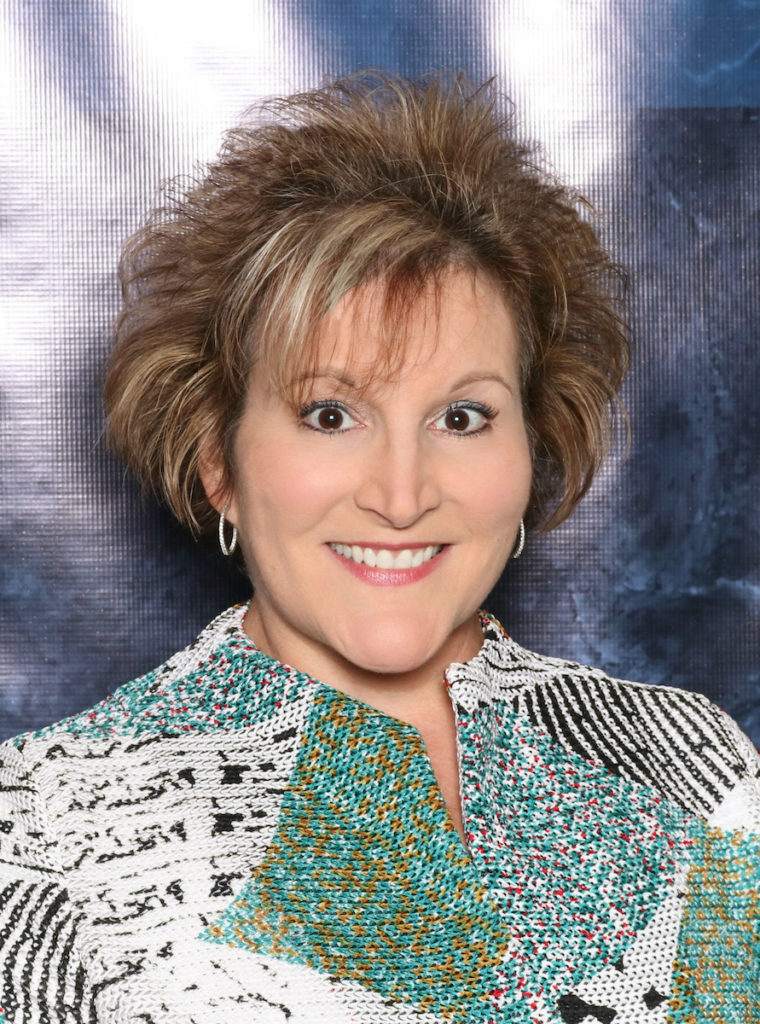
Kim Patterson is president of the Central Texas Chapter of the Association of Fundraising Professionals, and she serves as executive director of McLennan Community College Foundation and the Office of Institutional Advancement. Patterson is a graduate of Baylor University with undergraduate degrees in journalism and marketing and of Tarleton State University with a master’s degree in management and leadership. She and her husband, Frank, have two grown children and enjoy camping, fishing, and hiking.
The Act Locally Waco blog publishes posts with a connection to these aspirations for Waco. If you are interested in writing for the Act Locally Waco Blog, please email Ferrell Foster at [email protected].
Editor: Act Locally Waco is sharing a series of blog posts — Faith Doing Good — about local religious groups working in the community. These pieces were written by Baylor University students from the Department of Journalism, Public Relations, and New Media.
By Ashley Kim
The Rev. Dr. Leslie King, pastor of First Presbyterian Church, explains how the church and the congregation is “doing good” in the city of Waco, which involves building relationships between the church and everything surrounding it.
“I think one of the things that we do is we really try to know ourselves,” King said. “First Presbyterian Church tries to honor all the churches that we’re in relationship with, but we try to be uniquely who we are. And one of the things that we’re pretty good at is inclusion and just sort of a radical hospitality.”
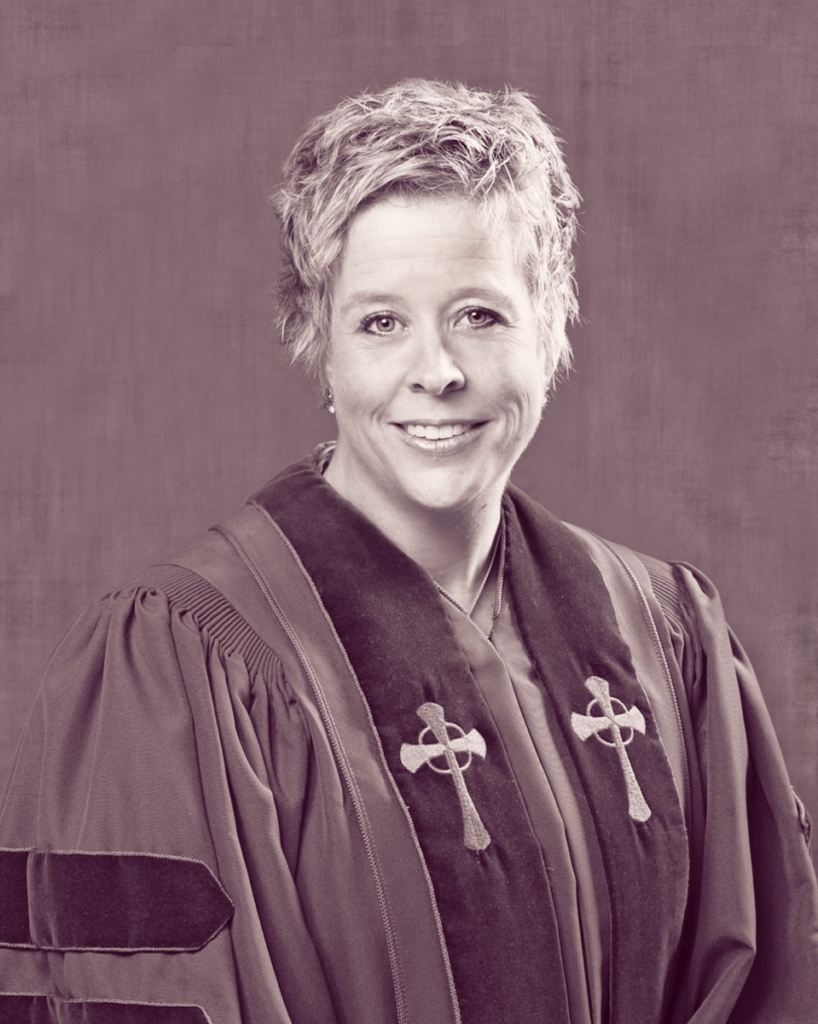
According to the First Presbyterian Church website, their mission is to believe deeply that people of faith are called to serve the wider community and neighbors, and they engage in this in several ways. Each Sunday, they begin worship by saying, “Welcome home, children of God.” They hope to live more fully into all that this simple but profound sentence means and calls them to do.
King believes part of “doing good” consists of being a person or a church that gives and receives. The church is also partnered with different entities, agencies, and projects that are around; entities like Caritas, The Cove, Compassion Ministries, and World Hunger Relief.
“I think the verb ‘doing’ would really have us emphasize sort of an old paradigm of mission, which is where we go out and do something for someone else that makes their lives better,” King said. “But of course, the emerging understanding is really, how is the church in relationship with the world around us. Do we know names and do people know our names and are we just being together? And I think that has a lot to do with the common good.”
First Presbyterian members decided to do worship this year in person and were intentional about an online platform that allowed for people to interact. While videoing services would have provided a more professional or polished look, they believed that one of the big components of worship is that people get to see and interact with each other.
“The first thing you have to do is really know yourself and to say this is who we are, and this is what we’re offering,” King said. “The Presbyterian faith also really values questions, and so we’re less concerned about telling people what to think and more interested in learning what people are wondering about. And helping people to do what people do really well, which is to, in the presence of God, make meaning in their life. And I think we do a decent job of that.”
First Presbyterian is involved in actively creating opportunities for the community and the congregation. Whether it be raising money for rent assistance for those impacted by COVID-19, providing outlets for mental health, distributing meals, partnering with organizations, or making their worship style more inclusive, First Presbyterian has done a lot for their community.
“When we do something for ourselves, we’re kind of thinking how we can also be doing something for the community at the same time,” King said.

Ashley Kim, a sophomore Baylor student from Houston, is majoring in marketing with a minor in advertising.
The Act Locally Waco blog publishes posts with a connection to these aspirations for Waco. If you are interested in writing for the Act Locally Waco Blog, please email Ferrell Foster at [email protected].
Custodians and cafeteria workers will receive a $1,000 incentive for hard-to-fill positions.
By Josh Wucher
During Thursday night’s school board meeting, Waco ISD trustees unanimously approved a multi-year plan to pay classroom teachers $10,000 in retention. The district will use $8.1 million from the Elementary and Secondary School Emergency Relief grant to fund the bonuses over the next three school years.
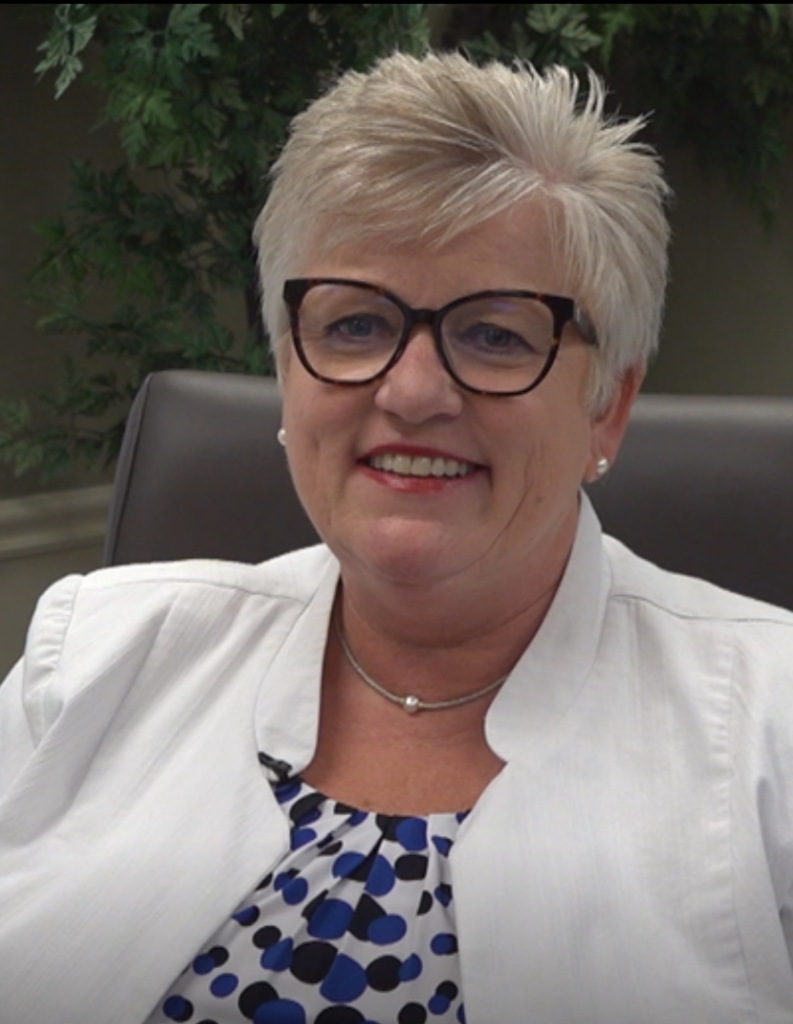
“Considering the shortage of certified teachers throughout the State of Texas, it’s essential that we show our appreciation and encourage our best and brightest to stay in Waco ISD,” Superintendent Dr. Susan Kincannon said. “Getting our teachers in place, providing our students with stability is really important right now and we want our students to succeed.”
The retention bonuses are structured in tiered payments depending on teacher start dates. For teachers beginning this August, a total retention bonus of $10,000 will be divided into three payouts across December 2022, December 2023 and September 2024; for new hires starting August 2022, $5,000 will be divided into two payouts across December 2023 and September 2024; and new hires starting August 2023 will receive a one-time payment of $2,500 in September 2024.
“Our educators placed themselves on the front lines during this pandemic, and we have the funds to show that not only do we value our teachers, we want them to stay with us,” Board President Angela Tekell said. “These retention bonuses reflect the Board’s and district’s ongoing commitment to staying competitive in recruiting and retaining hardworking educators who are passionate about addressing our students’ academic and social emotional needs.”
The Board also approved an additional $500,500 in ESSER funding for retention bonuses for custodians and cafeteria workers. There will be three total payouts based on the employee’s years of service with the district: 0-4 years – $500; 5-9 years – $750; and 10+ years – $1000. The three payout dates are December of 2022 and 2023 and September of 2024.
“We average about 12-15 custodial vacancies and 35-40 cafeteria worker vacancies at any given time during the school year,” Kincannon said. “Though these positions are hard to fill, they are incredibly rewarding jobs for people who care about our kids and want to make a difference.”

Joshua Wucher is Waco ISD’s executive director for communications.
The Act Locally Waco blog publishes posts with a connection to these aspirations for Waco. If you are interested in writing for the Act Locally Waco Blog, please email Ferrell Foster at [email protected].
By Ferrell Foster
Fifteen months into my life as a Waco resident, I’ve discovered something new — local restaurant food inspection scores. It’s on the City of Waco website.
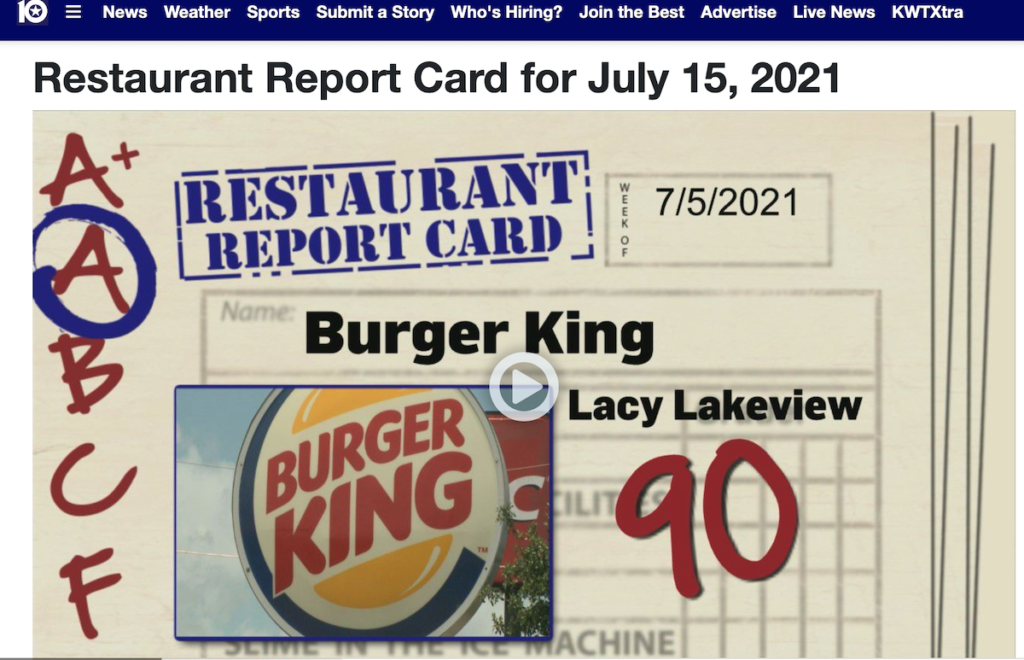
I ran across this when I saw a story about the scores on KWTX channel 10’s website. I do not totally understand why the scores in the KWTX report do not match up with scores on the city site for the same restaurant; I suspect it has something to do with the reporting day.
When it comes to restaurant scores, lower is better. On the city site there are many zeros (hooray!) and the vast majority have scores in the single digits (more subdued celebration).
The channel 10 report highlighted two Greater Waco scores of 90. Yikes! And the losers are: Burger King #3714 at 103 East Loop 340 in Lacy Lakeview and Cracker Barrel #166 at 4275 North IH-35 in Lacy Lakeview.
Wouldn’t it be nice if restaurants had to to post, in 12-inch lettering on their doors, their most recent score. You’re walking up to your favorite place, which has always in the past had a big “0” on its door, to find a “75.” Whoa! Better think before you open the door and spend your money. Thoughts: There is a new manager. Last time I was here the mashed potatoes didn’t seem right.
Well, restaurants do not have to post their numbers, but we can look them up online, so that’s pretty cool. (Of course, some people do not have Internet access, so they are at a disadvantage in getting this info. Inequities are real.)
I liked that channel 10, after outing the bad players, presented this week’s Clean Plate Award winner — Mamaka Bowls at 215 South University Parks Dr. in Waco, “which obviously got a perfect food inspection score.”
Mamaka’s has endless combinations, the TV station reports. “There are specialty ingredients such as almond butter, cacao nibs, coconut shreds, and spirulina, which is basically blue-green algae. Of course, if you like it plain and simple, items like The Mac with mango, strawberry, pineapple, orange juice, topped with the fruit and a little homemade granola could treat your taste buds right.”
Publicly posted restaurant inspection scores protect all of us from bad players and helps us find the good ones. There simply is no go way for consumers to know what’s going on in the kitchen without such scores. You can get some clues about the cleanliness of a restaurant from how it cares for it’s dining area and, especially, its restrooms. (I have a desire to visit a restroom before I order. Sometimes I regret I went after eating.)
Food is important. A big tip of the hat to the many, many restaurants who are working hard to keep it clean. We need to honor them with our dollars. There are options; we don’t have to do business with dirty eateries. Of course, I wish they would all earn a zero. That would be better for everyone.
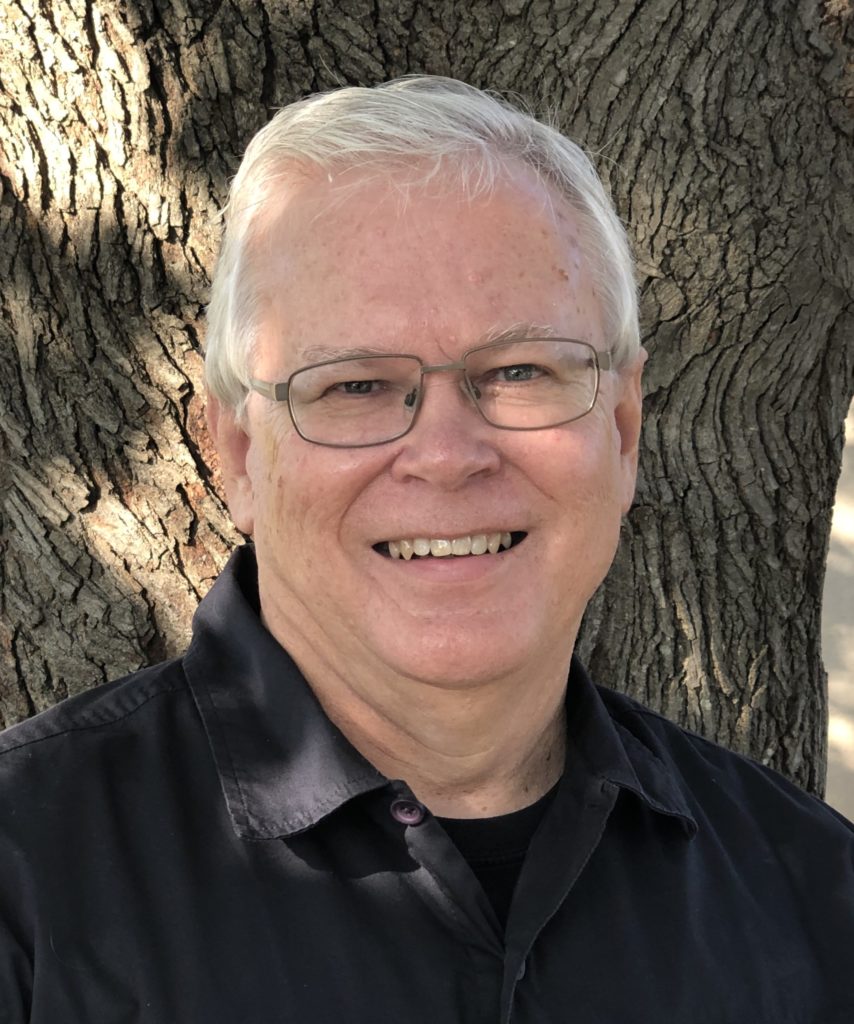
Ferrell Foster is acting executive director of Act Locally Waco and senior content specialist for care and communication with Prosper Waco.
The Act Locally Waco blog publishes posts with a connection to these aspirations for Waco. If you are interested in writing for the Act Locally Waco Blog, please email Ferrell Foster at [email protected].
Editor: Act Locally Waco is sharing a series of blog posts — Faith Doing Good — about local religious groups working in the community. These pieces were written by Baylor University students from the Department of Journalism, Public Relations, and New Media.
By Kaylee Cannon
Derek Nease, the family teaching pastor at Crossroads Fellowship in Waco, expressed his love for the Waco community and gave details on how COVID-19 has affected the church congregation.
“The church is more than just a building, it’s more than just a place in the neighborhood. It truly is a group of people that want to see the gospel of Jesus Christ go forth,” Nease said.
Nease said one of his favorite parts about serving the Waco community is the healthy partnership and communication among many of the churches in the area. It’s not just a certain denomination, but all of the churches coming together to serve the community.
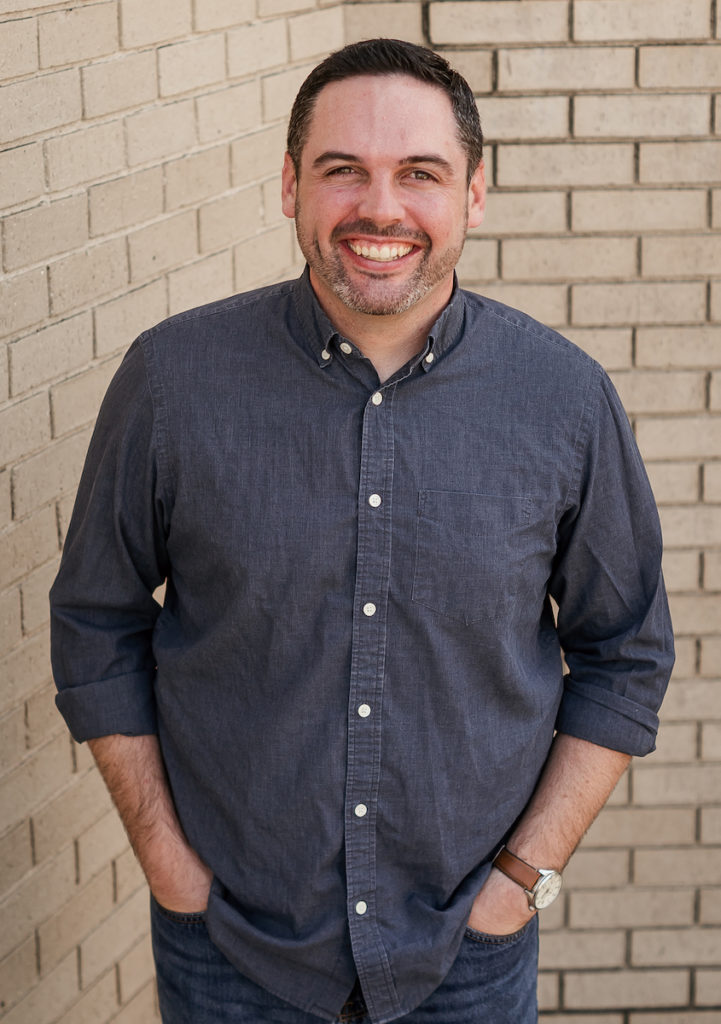
“That’s what I love about this community. That there are pastors that are willing to say I have a church I am leading, but the bigger thing is how we as a city can do this together,” Nease said.
Nease said the church had a project in November 2020 called, “All In.” They worked with organizations such as Mission Waco to help the community with various needs.
According to the Crossroads Fellowship website, part of their mission is to form relationships. They believe relationships with God and each other form the foundation of their purpose as a church.
“What I enjoy about the Waco community is that the people have appreciated and welcomed us in and have said thank you for still being a part of bringing change whether we’re able to meet in-person or not,” Nease said.
Nease said that the church had to make quick changes to follow COVID-19 guidelines. They had to get the Sunday teachings available for people to watch and listen to online. In the spring, they began holding in-person services with masks, as well as streaming online for those who wished to stay home.
“What do we value as a church organization? Do we value the meeting? Or do we value life transformation?”COVID-19 helped people “realize how we can still have an impact on people’s lives,” Nease said.
Crossroads Fellowship believes in meeting people where they are with a welcoming environment with accessible worship and preaching, its website says.
“We have and will continue to do the missional things that we always do which brings people, even those not in the church, together,” Nease said.
Communication among churches is new in Waco, Nease said. It has been a very good change in the community as pastors have gathered to pray.
“It’s special for several hundred pastors to be in one room together and pray together,” Nease said. “Not only for their organization and their church specifically, but for the name of Jesus to be raised and praised in the city of Waco.”

Kaylee Cannon is a sophomore at Baylor University majoring in business management with a minor in public relations. She is from Jacksonville, Ore.
The Act Locally Waco blog publishes posts with a connection to these aspirations for Waco. If you are interested in writing for the Act Locally Waco Blog, please email Ferrell Foster at [email protected].
Special from

By Linda Crawford
You know those people who seem to know everybody, right? Alfred Solano is one of those people.
You have a fantastic idea and you want to introduce it to key people who can make it happen. Call Alfred Solano.
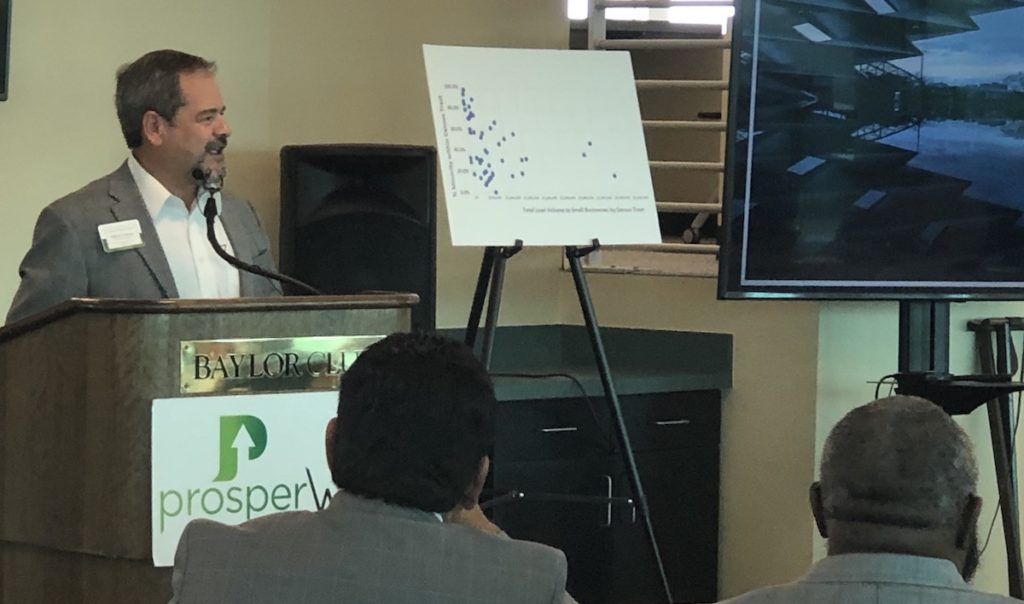
You need to meet people who can help you finish up a major project. No problem. Call Alfred Solano.
You simply want to meet certain leaders in the community, but you have no idea where to start. You guessed it. Call Alfred Solano.
Even if you need a good restaurant recommendation, just call Alfred Solano.
And think about it. How could he now know everybody? It seems that no organization is too large or too small for him to dedicate his time. His community activities are numerous and exceptionally diverse, like serving as chairman of the boards of Prosper Waco and Waco Family Medicine.
Ferrell Foster, who is acting executive director of Act Locally Waco and senior specialist for care & communication with Prosper Waco, met Solano through his service on the Prosper Waco Board of Directors.
“Later,” explained Foster, “another local Hispanic leader invited me to a monthly luncheon at the Hispanic Chamber. Alfred called later to thank me for coming to the luncheon and said I was always welcome. As a White male in a new place, it meant a lot to me to be welcomed into a relationship with my Hispanic neighbors, who are so important to the life and vitality of Waco. Alfred is that kind of man; he is always drawing people into purposeful relationships with one another.”
Others with Prosper Waco have similar things to say about Solano. Dexter Hall, chief of staff and senior content specialist for financial security with Prosper Waco, comes in contact with a lot of people. He knows those who are “for you,” and he knows those “who are not.” He calls Solano “selfless in his giving.”
Hall’s co-worker agrees. “Alfred is an engaging and caring leader in our community who thinks of others each and every day,” added Hermann Pereira, chief program officer at Prosper Waco.
“He is dedicated to growing and investing the next batch of leaders in our community. Alfred is passionate about equity in our community and is someone who ‘walks the walk’ in every interaction he has.”
If you tried to figure out Solano’s main interests, that would be nearly impossible. He’s like the wind; he is everywhere. Kim Patterson, executive director of McLennan Community College Foundation and Institutional Advancement, used some of the exact words in her description of Solano. He loves pushing education, se he is on the board of the MCC Foundation.
“Alfred is a connector, always focusing on others and how he can help bring our community together. We often say, ‘That guy is everywhere!’ and it’s true; he is very intentional about that. He inspires me to strive to do more and be even more engaged in our hometown.”
Solano was raised in Waco and is a graduate of Texas State Technical College. After 35 years in business, he is now president and CEO of the Cen-Tex Hispanic Chamber of Commerce in Waco, a role he has held for three years. In the time under this leadership, the CTHCC has been recognized as the Small Chamber of the Year 2019 by the Texas Association of Mexican American Chambers.
For Solano, serving on the CTHCC board for many years opened doors to many opportunities, shaping his “passion for engaging businesses with the non-profit sector,” says Solano.
He’s a board member of several other organizations, too — Hillcrest Health System, which is totally different from StartUp Waco, where he is also on the board. If you want to keep up with local happenings in Waco, call Solano. He’s a board member with Act Locally Waco, KWBU, and Heart of Texas Economic Development District. I am pretty sure the list goes on.
But if you just need a friend, someone to talk to, you can also call Solano. He’ll serve in that role, as well. We think, however, that Hall says it best.
“In a world where everyone is striving to be Number 1 and on the “A” team, Alfred Solano is a devout communitarian giver that pushes and pulls everyone forward . . . [exemplifying] that to be humane is to be a great human being.”
Alfred and his wife, Rachel, have been married for 13 years and are very proud of Alfred’s daughter, Elena Solano, a psychotherapist in Austin.

Linda Crawford, owner of The Anchor News, is an English professor at McLennan Community College, a motivational speaker, and author of the book, God, Destiny and a Glass of Wine (available on Amazon).
The Act Locally Waco blog publishes posts with a connection to these aspirations for Waco. If you are interested in writing for the Act Locally Waco Blog, please email Ferrell Foster at [email protected].
Editor: Act Locally Waco is sharing a series of blog posts — Faith Doing Good — about local religious groups working in the community. These pieces were written by Baylor University students from the Department of Journalism, Public Relations, and New Media.
By Brooke Giacin
Temple Rodef Sholom may be small, but during the pandemic they have come together to find unique ways to grow from within their small congregation.
Monica O’Desky, Temple Rodef Sholom’s cantor, said the synagogue’s community service is completed on an individual basis rather than a congregation-wide basis.
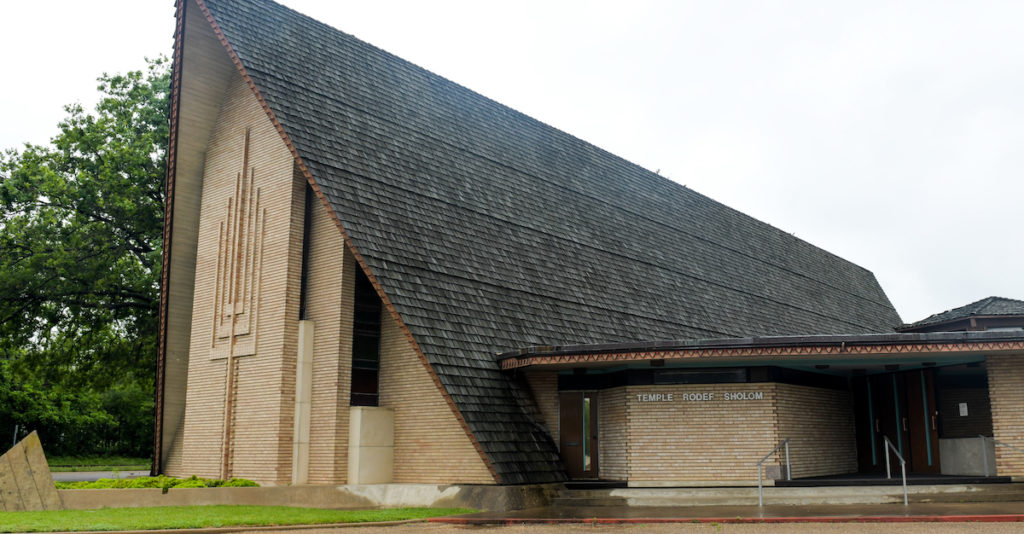
“This is partially because our numbers are relatively small,” O’Desky said. “People are somewhat scattered. In a larger congregation, you would have different activity groups.”
Temple Rodef Sholom’s congregation has nearly 40 members. Many members do their own community outreach. For example, some individuals devote their time to volunteering with Planned Parenthood.
Prior to O’Desky’s arrival, the congregation was very small. Over time the spirit of the congregation began to look better and numbers increased, O’Desky said. The music created an essence that encouraged people to attend services more frequently.
“During the pandemic, having to come up with socially distant but different strategies has been tough,” O’Desky said. “The Zoom services have strangely been successful. We get more people on Zoom than we do in person.”
O’Desky said she tries to make the live and Zoom services inclusive and different.
“We conduct our services a little bit more loosey goosey. I bring a lot of outside influences, some from conservative traditions, some from way out there, some from whatever,” O’Desky said. “We are not quite so rigid. We have done drum services where I bring out drums, tambourines, and rhythm instruments. It is all projected on a PowerPoint.”
O’Desky said she kept the congregation interconnected through interactive discussions, singing songs, and playing music.
“I like to make each service special for the congregation,” O’Desky said. “Where I was ordained, it was not affiliated with one of the movements. It was not reform. It was not conservative. So we learned everything.”
O’Desky said the congregation faced its greatest challenges during the Jewish high holidays: Passover, Yom Kippur, and Rosh Hashanah.
“We just finished Passover,” O’Desky said. “We had a marvelous group put together take-home Passover bags which had all the stuff you need to make and to host your own little Seder.”
O’Desky said high holidays for the Jewish faith are a time of gathering as a family. Temple Rodef Sholom tried to make these services more interactive and special while following COVID-19 guidelines.
“I did an hour-long Passover video that was with members of the congregation doing the readings and doing the parts and then edited it into a video,” O’Desky said. “It was partly the Abilene congregation and partly here. It wasn’t just me standing there.”
The Zoom services on Fridays and Saturdays consist of the Abilene congregation and the Waco congregation. O’Desky said the video allowed both congregations to see people they know who were participating. The congregations are very similar — small, few kids, and with many elders.
“Since they Zoom together so often, when the congregations came together online and watched this video it was like seeing family,” O’Desky said. “I did that also for the other high holidays. I actually videoed myself part from the Abilene congregation and part here so everyone saw their own sanctuary.”
With the wide availability of vaccinations, Temple Rodef Sholom has been holding more live services. O’Desky said their goal is to continue to make their congregation cohesive during these times.
“We hope more people will feel comfortable to come to the live services,” O’Desky said. “I cannot wait to finally see my congregation in person again.”

Brooke Giacin is a sophomore student-athlete majoring in journalism and finance at Baylor University.
The Act Locally Waco blog publishes posts with a connection to these aspirations for Waco. If you are interested in writing for the Act Locally Waco Blog, please email Ferrell Foster at [email protected].
By Terry Wright
Baylor University’s Lifelong Learning is excited to join the Mayborn Museum Complex and give our long-standing program a new home. Lifelong Learning is a primarily volunteer-led membership-based organization that offers an array of learning opportunities and experiences.
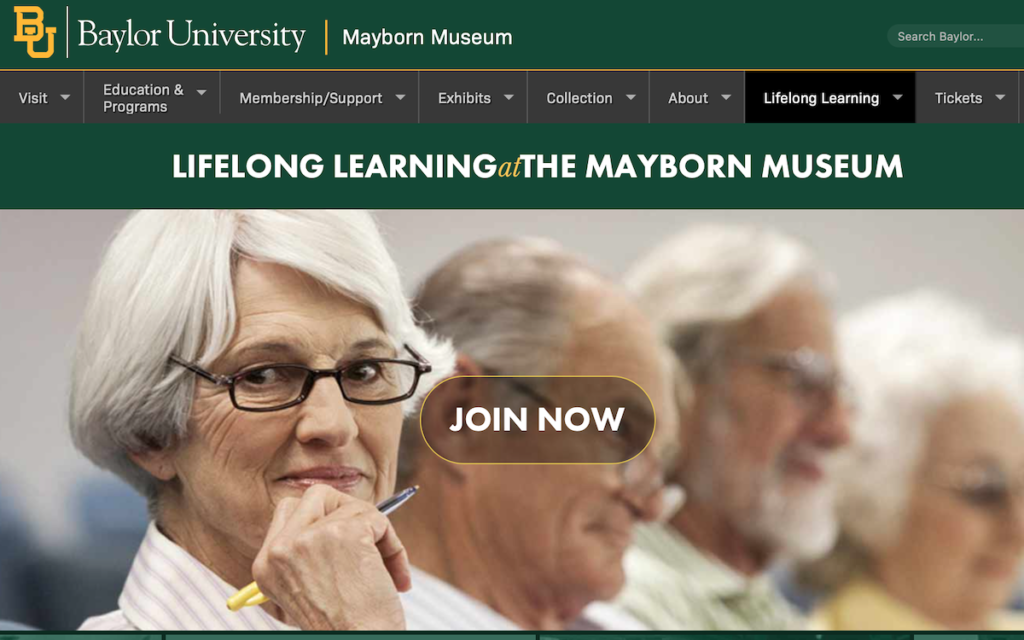
Each fall and spring semester, member-designed courses and special events entice intellectually curious adults, age 50 and older, to explore a wide range of interests. Join us if you are looking for a comfortable venue for friendship, leadership opportunities, and stimulating learning.
Members of the Lifelong Learning program are invited to join us at the Mayborn 11:30 a.m.-2 p.m. Friday, July 30, for a Membership Picnic. This will be our first official event since formally merging with the museum June 1. This lunchtime event (food served 11:30 a.m.-1 p.m.) will include a hot dog picnic and a museum trivia contest. Admission for the event is a paid annual membership to Baylor Lifelong Learning at the Mayborn for the 2021-2022 program year.
A special museum trivia contest has been developed for the event for those who want to participate. LLL members will receive a form to fill in the blanks as they move from room to room in the museum. The activity is designed for approximately 60-90 minutes of museum viewing. Forms can be submitted at the end of the activity (before 3:00 pm) with the five LLL members earning the most points receiving prizes.
Current, former, and new Lifelong Learning members are encouraged to sign up for membership prior to the Membership Picnic. Membership status will be verified before admittance. A Lifelong Learning membership includes a membership to the Mayborn Museum and also enables the LLL member to enroll in fall/spring courses for the coming year at $20 per course, as well as to attend coffee speakers and other special events.
Learn more about Lifelong Learning and purchase a membership at baylor.edu/mayborn/lifelonglearning.
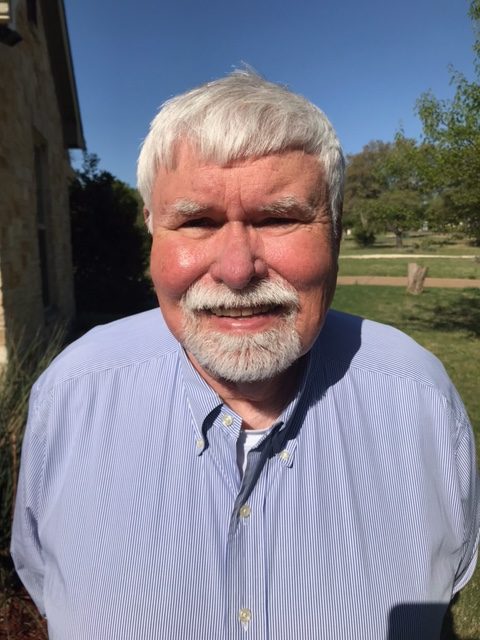
Terry Wright has called Waco home since 1981. He initially worked for a local nonprofit. In 1997, he joined Baylor as the system analyst in the Office for Scholarships and Financial Aid, where he worked until his retirement in 2017. Terry was introduced to BU Lifelong Learning by his wife, Linda, where they have both been active in courses and events for many years. He was installed as president of the organization in June.
The Act Locally Waco blog publishes posts with a connection to these aspirations for Waco. If you are interested in writing for the Act Locally Waco Blog, please email Ferrell Foster at [email protected].
Editor: Act Locally Waco is sharing a series of blog posts — Faith Doing Good — about local religious groups working in the community. These pieces were written by Baylor University students from the Department of Journalism, Public Relations, and New Media.
By Jenna Fitzgerald
St. Matthew Lutheran Church is a congregation of about 300 parishioners and has many members who are ready to serve.
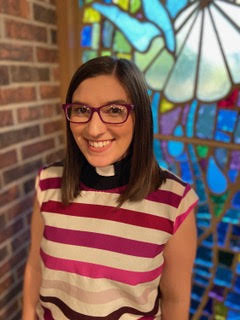
According to St. Matthew’s website, the church mission statement is “to serve our neighbors as Christ’s family in service.” Rev. Kelsey Fitting-Snyder, pastor of St. Matthew, said this vision means that service extends beyond St. Matthew to the entire Waco community.
“As a pastor in the Evangelical Lutheran Church in America, I’m called to St. Matthew Lutheran Church to serve as pastor, but our vocation is always about serving God’s people wherever we are, in the communities,” Fitting-Snyder said. “For us, there’s not a separation of ‘you love God’ and ‘you love your neighbor.’ No matter what vocation you are in — if you’re a pastor or a student or a scientist — vocation for us is showing our Christian love through the work that we do.”
Fitting-Snyder has been pastor of St. Matthew since September 2019, and during the COVID-19 pandemic she spent the majority of her time finding ways to serve. She took note of how some parishioners donated their stimulus checks to set up a church-wide fund. The fund is used to support parishioners in need, as well as the church’s benevolences, which are the organizations it gives to regularly like Mission Waco, Caritas of Waco, and Lutheran Sunset Ministries.
“During COVID, everyone’s budgets were tight, and while clothing donations and food donations are really important, what a lot of those organizations needed to keep going was money,” Fitting-Snyder said. “We were fortunate enough and people’s hearts here are so big that they wanted to make sure that we didn’t cut back on our giving out to the community, but that it was increased in that time so that people were still able to get the services that they needed.”
In addition to providing monetary aid, St. Matthew put together care packages for people in nursing homes and continued its quilting ministry.
Fitting-Snyder said one of the most important projects it undertook, though, was a drive for sanitization supplies for its teachers and professors.
“We have a bunch of teachers in our congregation, elementary school teachers and Baylor professors and things like that, so when sanitizer and Clorox wipes and stuff were really scarce, we started taking donations from our people,” Fitting-Snyder said. “Even after the shortage, people still kept bringing them, so I still have some here to give to my teachers when they say, ‘Hey, we need some more Clorox wipes.’ When the schools were short on supplies, that was just one thing that we could do to help lighten the burden.”
Fitting-Snyder emphasized that members of the congregation can utilize their gifts to find small ways to do good, which can eventually build into far-reaching, impactful community service.
“I firmly believe that there’s no act of kindness or ministry or anything that is too small,” Fitting-Snyder said. “The analogy I love for that is, if you’re sitting in a kayak on the river, that one little kayak is displacing water, and because that water underneath you is displaced, it’s affecting the whole river. A lot of times, rivers make their way into larger bodies of water, so your one little kayak is impacting and rippling to something much bigger. That’s how I see our ministry happening here.”
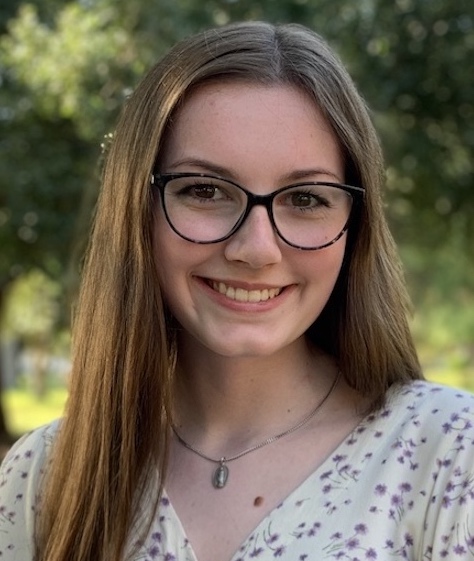
Jenna Fitzgerald is a freshman university scholars major at Baylor, concentrating in journalism, Spanish, political science, and poverty studies and social justice.
The Act Locally Waco blog publishes posts with a connection to these aspirations for Waco. If you are interested in writing for the Act Locally Waco Blog, please email Ferrell Foster at [email protected].
